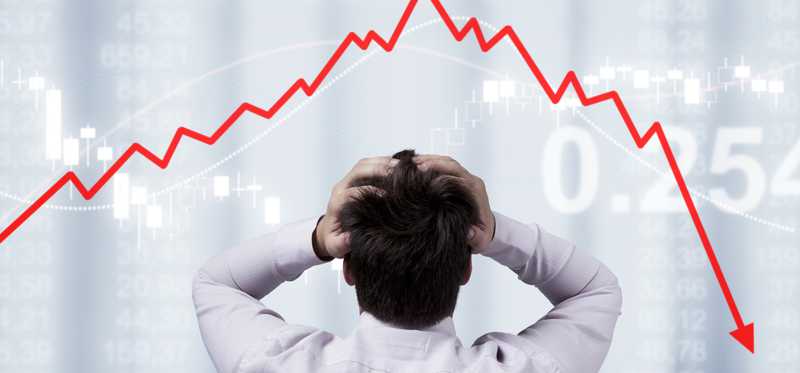15 Financial Moves to Make During a Market Dip

15 Financial Moves to Make During a Market Dip
Be ready for a market drop
The stock market can dip, drop, or plunge at any time. (That's why you never want to have money invested in stocks that you expect to need within a few years -- you don't want to have to sell shares when they're temporarily down.) Here's a look at some smart things you can do the next time the market retreats -- and many of them might be done at other times, too.
5 Winning Stocks Under $49
We hear it over and over from investors, “I wish I had bought Amazon or Netflix when they were first recommended by the Motley Fool. I’d be sitting on a gold mine!” And it’s true. And while Amazon and Netflix have had a good run, we think these 5 other stocks are screaming buys. And you can buy them now for less than $49 a share! Simply click here to learn how to get your copy of “5 Growth Stocks Under $49” for FREE for a limited time only.
Previous
Next

1. Take deep breaths
First off, don't freak out. A big drop in the stock market can be unsettling, especially for newer investors, but it shouldn't be. In fact, it should be expected. Market drops simply happen every few years or so -- noteworthy ones happen almost every two years, in fact, roughly. So rest assured that it's not a matter of something rare and horrible happening.
ALSO READ: Market Crash Concerns Keeping You Up at Night? 5 Ways to Brace Your Portfolio
Previous
Next

2. Don't sell in a panic
Stock market corrections and crashes are often associated with people panicking. Indeed, when there's a notable initial market downturn, that can rattle enough people into selling shares of stocks they own -- and that selling can exacerbate the downturn. It can even become a vicious circle -- stocks crashing, investors selling, stocks crashing more, investors selling more, and so on. Remember that stock markets have always recovered from crashes -- going on to set new highs.
Previous
Next

3. Focus on the long term
Actually, there are some investors who might need to panic during a market downturn -- those would be short-term investors. If you've invested in a particular stock or fund and plan to sell out of it shortly -- and then the market crashes, well, you'll be selling at a loss. The stock market is a remarkable wealth builder, but it arguably best serves those who are investing for the long term -- buying securities with the aim of holding them for a bunch of years, if not decades.
Previous
Next

4. Check the health of your emergency fund
If the market crashes, that would be a good time to assess the health of your emergency fund. (If fact, that's best done well before a crash -- do it now, or soon.) That's because many market crashes happen in tandem with economic downturns. There may be a greater chance of your household suffering a job loss, and that can be made much less financially devastating if you've prepared for it by socking away several months' worth of living expenses.
ALSO READ: 4 Reasons Not To Worry About a Stock Market Crash
Previous
Next

5. Establish an emergency fund if don't have one
If you're thinking, "Gee… I can't assess the health of my emergency fund because I don't have one," it's time to set one up. It can save your hide in lots of situations, not just economic downturns. If, for example, the car you depend upon heavily suddenly needs a new transmission, or a loved one suffers an accident or a health setback that results in a multi-thousand-dollar hospital bill, you need to be able to handle that.
5 Winning Stocks Under $49
We hear it over and over from investors, “I wish I had bought Amazon or Netflix when they were first recommended by the Motley Fool. I’d be sitting on a gold mine!” And it’s true. And while Amazon and Netflix have had a good run, we think these 5 other stocks are screaming buys. And you can buy them now for less than $49 a share! Simply click here to learn how to get your copy of “5 Growth Stocks Under $49” for FREE for a limited time only.
Previous
Next

6. Consult your watch list
When the stock market swoons, it's a great time to consult your watch list of stocks that have interested you. See which ones have fallen far enough that they're now attractively priced. You may have added Buzzy's Broccoli Beer (ticker: BRRRP) three months ago when it seemed a bit too pricey at $168 per share, but it may now be trading for around $120 per share, near your estimate of its fair value -- or below that.
Previous
Next

7. Establish a watch list if you don't have one
What's that? You don't have a stock watch list? Then consider setting one up. You can do it in all kinds of ways. A rudimentary one might be a list of stocks scribbled in a notebook. A better approach is to set up a fake portfolio online, adding stocks that interest you as you run across them. I like to add those stocks at their stock price on the day that I add them to the list. Then, whenever I check the list, I can see how far above or below that price they currently are. An even better system might be to add stocks to your list at what you estimate their fair value is. Then, any time you review the list, you'll see which stocks are far above or below your estimate of their worth. This system will require you to update your estimates regularly, though.
ALSO READ: 3 Top Stocks to Buy Without Hesitation If There's an October Stock Market Crash
Previous
Next

8. Go shopping for great stocks on sale
With or without a watch list, it's worth strolling down the aisles of the stock market after a market crash, looking for bargains. Companies you would love to own shares of may have had stock prices just too steep for your comfort level, above your estimate of their intrinsic value -- but after a crash, they may be much more appealingly priced. Reading through articles at Fool.com can also yield some great investing ideas after crashes -- and even before them.
Previous
Next

9. Aim to hold stock in 25 or more companies
As you invest, buying stocks, consider aiming to own at least 25 of them. Yes, ideally you'll want to keep up with their progress, but the advantage in spreading your dollars across many stocks is that no cratering stock will crush your portfolio, and you'll be more likely to have invested in one or several amazing performers.
Previous
Next

10. Prepare to hang on for five or more years
Once you buy into stocks, aim to hold them for at least five or so years. Why? Well, to give them a chance to perform the way you think they can. Look at the stock chart of any long-term amazing performer and you'll see that while the line goes up over time, often sharply, it is also a jagged, zigzag line. There are downturns and points at which many investors bailed. So keep tabs on your holdings, in order to regularly reassure yourself that their futures look bright, and aim to hold them for a long time. But if you lose confidence along the way, selling can make sense.
5 Winning Stocks Under $49
We hear it over and over from investors, “I wish I had bought Amazon or Netflix when they were first recommended by the Motley Fool. I’d be sitting on a gold mine!” And it’s true. And while Amazon and Netflix have had a good run, we think these 5 other stocks are screaming buys. And you can buy them now for less than $49 a share! Simply click here to learn how to get your copy of “5 Growth Stocks Under $49” for FREE for a limited time only.
Previous
Next

11. Remember to consider valuation
As alluded to earlier, valuation is important in investing, so it's worth learning more about how to value a stock. If you can come up with an estimate of what you think a stock is worth, based on your expectations of its future performance, you can look at its current stock price and quickly see if it's overvalued or undervalued. Aim to buy stocks when they're undervalued, as that gives you a margin of safety.
ALSO READ: Here's 1 Stock That Could Make You Rich if the Stock Market Crashes
Previous
Next

12. Dividend payers can be especially powerful
Don't neglect dividend-paying stocks when seeking companies for your portfolio. That's because dividend payers tend to do well over time, and they offer not only stock price appreciation but also regular cash payments -- with those payments increasing over time, too. It's a powerful combination.
Previous
Next

13. Remember the beauty of index funds
If all this talk about studying stocks and learning to value them sounds too difficult, or too time-consuming, or simply like too much work, fear not -- you have an excellent alternative way to invest: through low-fee, broad-market index funds. Those are mutual funds or exchange-traded funds that track a particular index by investing in the same securities. An S&P 500 index fund, for example, will aim to deliver roughly the same return as the S&P 500 (less fees) by investing similarly. There are many index funds to choose from, and they're terrific choices for most of us.
Previous
Next

14. Consider dollar-cost averaging
Another solid approach to dealing with market downturns and crashes is to invest via dollar-cost averaging. When you do so, you invest a set amount at a set frequency over time -- for example, $1,000 every month or $2,000 every quarter. Determine how much you can sock away in stocks for the long run and regularly infuse your brokerage account with fresh cash, plunking it into shares of stocks you already own and/or stocks new to your portfolio. The beauty of this system is that you can ignore market volatility: When the market is booming, you may get fewer shares for your dollars, and when it's down, you'll get more shares.
ALSO READ: 3 Stock Market Crash Mistakes You Can't Afford to Make
Previous
Next

15. Do nothing
Finally, here's an excellent thing to do if the market crashes: nothing. If you're invested in the stocks (and/or funds) you want to be invested in, and you're a long-term investor who won't be needing to liquidate any holdings for at least, say, five years, then you shouldn't really care about a market crash. Wait it out, and the market will rebound and go on to set new highs.
5 Winning Stocks Under $49
We hear it over and over from investors, “I wish I had bought Amazon or Netflix when they were first recommended by the Motley Fool. I’d be sitting on a gold mine!” And it’s true. And while Amazon and Netflix have had a good run, we think these 5 other stocks are screaming buys. And you can buy them now for less than $49 a share! Simply click here to learn how to get your copy of “5 Growth Stocks Under $49” for FREE for a limited time only.
Previous
Next

Welcoming crashes
Many seasoned investors with a long-term focus actually crave crashes now and then -- especially when they have a bunch of cash that has accumulated in their financial accounts. As superinvestor Warren Buffett has noted, "A market downturn doesn't bother us. It is an opportunity to increase our ownership of great companies with great management at good prices."
The Motley Fool has a disclosure policy.
Previous
Next
Invest Smarter with The Motley Fool
Join Over Half a Million Premium Members Receiving…
- New Stock Picks Each Month
- Detailed Analysis of Companies
- Model Portfolios
- Live Streaming During Market Hours
- And Much More
READ MORE
HOW THE MOTLEY FOOL CAN HELP YOU
-
Premium Investing Guidance
Market beating stocks from our award-winning service
-
The Daily Upside Newsletter
Investment news and high-quality insights delivered straight to your inbox
-
Get Started Investing
You can do it. Successful investing in just a few steps
-
Win at Retirement
Secrets and strategies for the post-work life you want.
-
Find a Broker
Find the right brokerage account for you.
-
Listen to our Podcasts
Hear our experts take on stocks, the market, and how to invest.
Premium Investing Services
Invest better with The Motley Fool. Get stock recommendations, portfolio guidance, and more from The Motley Fool's premium services.